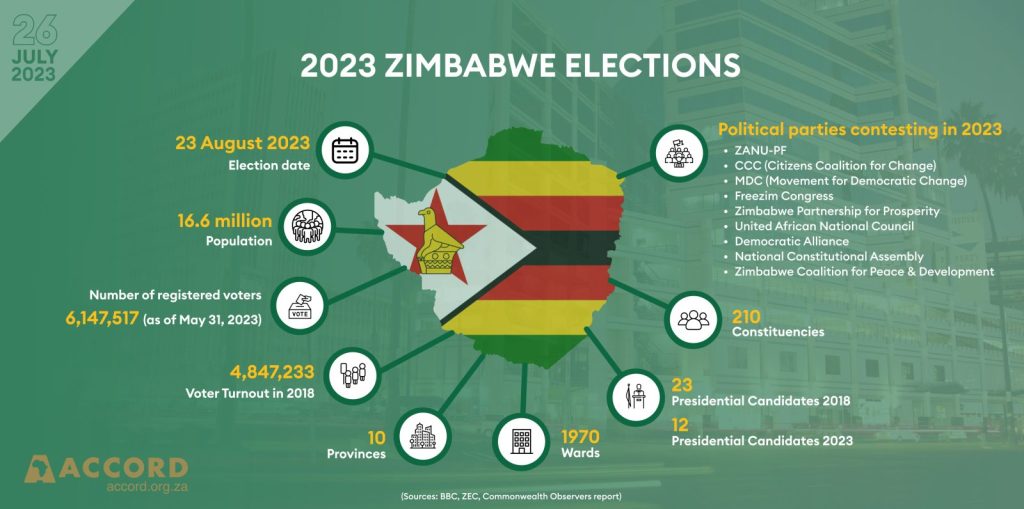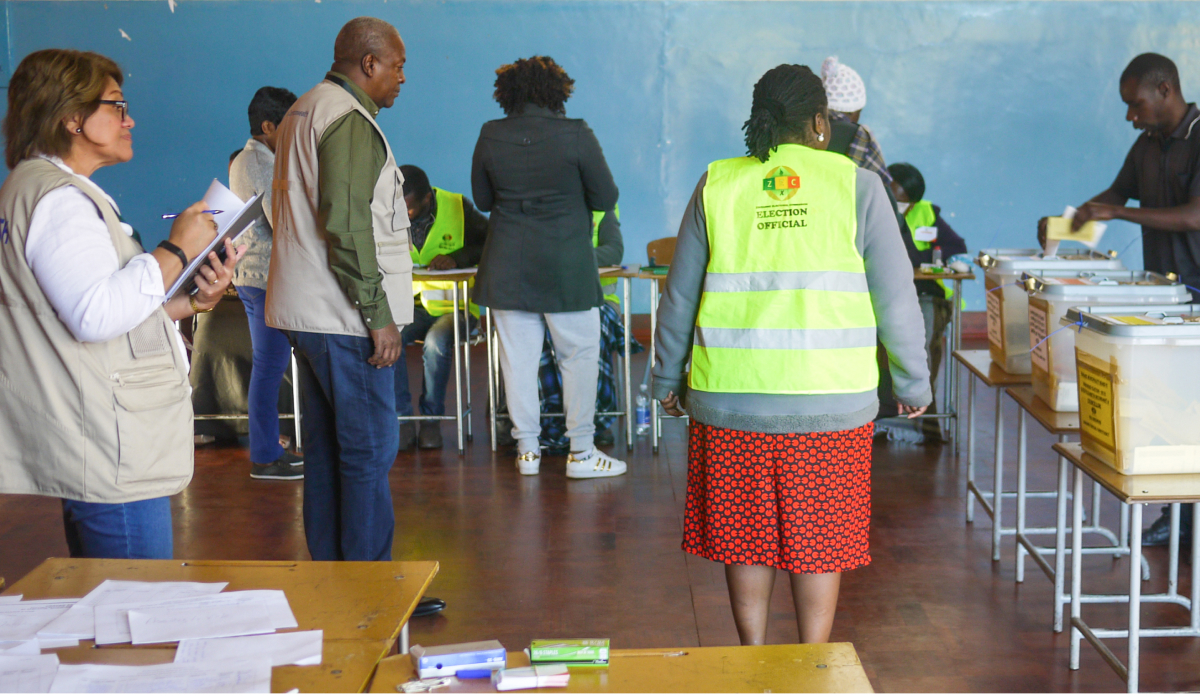The Zimbabwean government consists of an elected President and a legislature. The presidential term lasts for five years, and is elected by majority vote, with a second round if no candidate receives a majority in the first round. A candidate needs more than 50% of the vote to be declared the winner, otherwise there will be a run-off election between the top two. If there is no outright winner in the presidential contest, a run-off will be held six weeks later, on 2 October 2023. The Parliament of Zimbabwe is bicameral, consisting of the House of Assembly and Senate. For Members of Parliament and Council candidates, the election is won on a first-past-the-post basis.
12 candidates have been approved by the Zimbabwe Electoral Commission (ZEC) to contest for the presidency in the upcoming elections. This is a sharp decrease from the 23 presidential candidates who contested in 2018, the reason undoubtedly being the fee one has to pay to register as a candidate with the ZEC. In June 2023, Zimbabwe’s parliament approved the increase in fees to be paid by presidential candidates, from US$1,000 in 2018 to US$20,000, a decision regarded by the main opposition party, CCC as undermining the constitution, as it discriminates against citizens according to their economic status and excludes the poor and those on the margins. Candidates running for parliamentary and senatorial seats paid US$1,000 up from US$50 in 2018. Opposition parties claim that the sharp rise in the price of the ticket to run in these various elections favours the ruling ZANU-PF party, which they believe has more financial resources at its disposal.

12 candidates have been approved by the ZEC to contest for the presidency in the upcoming elections. This is a sharp decrease from the 23 presidential candidates who contested in 2018, the reason undoubtedly being the fee one has to pay to register as a candidate with the ZEC.
Tweet
Civil society groups and the opposition continue to express their doubt that the polls will be free and fair. Amnesty International cites that there is a worrying restriction of civic space underway in Zimbabwe with growing attempts to persecute anyone who dares to freely express themselves. Over the last 2 years, the arrests and convictions of opposition figures and government critics have intensified. For several years, the main opposition has demanded electoral reforms to level the playing field and provide access to public media but a number of the party’s meetings have been banned, or disrupted by the police. In early July, a planned campaign launch by the CCC was the third of its rallies to be banned, with the police citing problems with the venue that the party had selected. During the same week, police clashed with supporters of the opposition party, CCC, in the south-eastern town of Chiredzi, firing teargas, when the party’s campaign event was prevented from taking place. The police explained that the rally clashed with a state event – the opening of a new clinic by a government minister – and they did not have enough resources to handle both situations. The CCC has long complained about harassment and intimidation from authorities, with its gatherings disrupted and members detained, on what critics call politically motivated charges that show that the democratic space has been eroded and presents an uneven playing ground in this election.
Concerns from civil society and opposition parties have continued to rise after the President signed the Patriotic Act on 14 July 2023. The Southern Africa Litigation Centre has described this amendment by the Government of Zimbabwe as aiming to silence its citizens, civil society and political opposition in order to maintain the status quo. Among others, the bill includes section 22A to the Criminal Law Act, under which it criminalises “wilfully injuring the sovereignty and national interest of Zimbabwe.” Section 22A criminalises any meeting or any communication between a Zimbabwean citizen or permanent resident that involves or is facilitated by a foreign government or any of its agents with the aim of “subverting, upsetting, overthrowing or overturning the constitutional government in Zimbabwe.” The criminalisation of any communication constitutes an immediate threat to the constitutional right to freedom of expression. The vague and broad wording of the Act constitutes a high potential of abuse and misuse by state authorities to silence any dissent or criticism of state authorities.
Apart from the concern about the alleged stifling of freedom of expression, technical aspects of the election have also been queried. For example, opposition parties questioned why the ZEC had not released an electronic voters’ roll well ahead of time for scrutiny despite several court challenges. The ZEC’s actions were contrary to the country’s constitution in Section 21 (1), which stipulates that “every voters’ roll and every consolidated roll shall be a public document and open to inspection by the public, free of charge, during office hours at the office of the commission or the registration office where it is kept.” A number of civil society and opposition political parties suspect that the document could be manipulated even more than it already has been, as preliminary analysis showed it contains thousands of ghost voters and other numerous mistakes that could disenfranchise the electorate. Contrary to the opposition’s belief, on 21 July 2023, the ZEC dismissed claims by opposition candidates that the voters’ roll eventually distributed to candidates is not searchable and analysable. In a statement, the ZEC Chief Elections Officer stated that the voters’ roll met the provision of the Electoral Act as it was searchable and analysable. However, he noted that the Act permits the commission to format the voters’ roll to prevent it from being tampered or altered.
Opposition parties claim that the sharp rise in the price of the ticket to run in these various elections favours the ruling ZANU-PF party, which they believe has more financial resources at its disposal.
Tweet
The road to Zimbabwe’s upcoming elections on 23 August 2023 has been complex with a number of issues of contention and as highlighted in this article, many challenges to consolidate democracy have been flagged by opposition parties and civil society groups. Regional and international observers should be urged to bravely expose any irregularities during the electoral process.
Rumbidzaishe Matambo is a programme officer at ACCORD.


